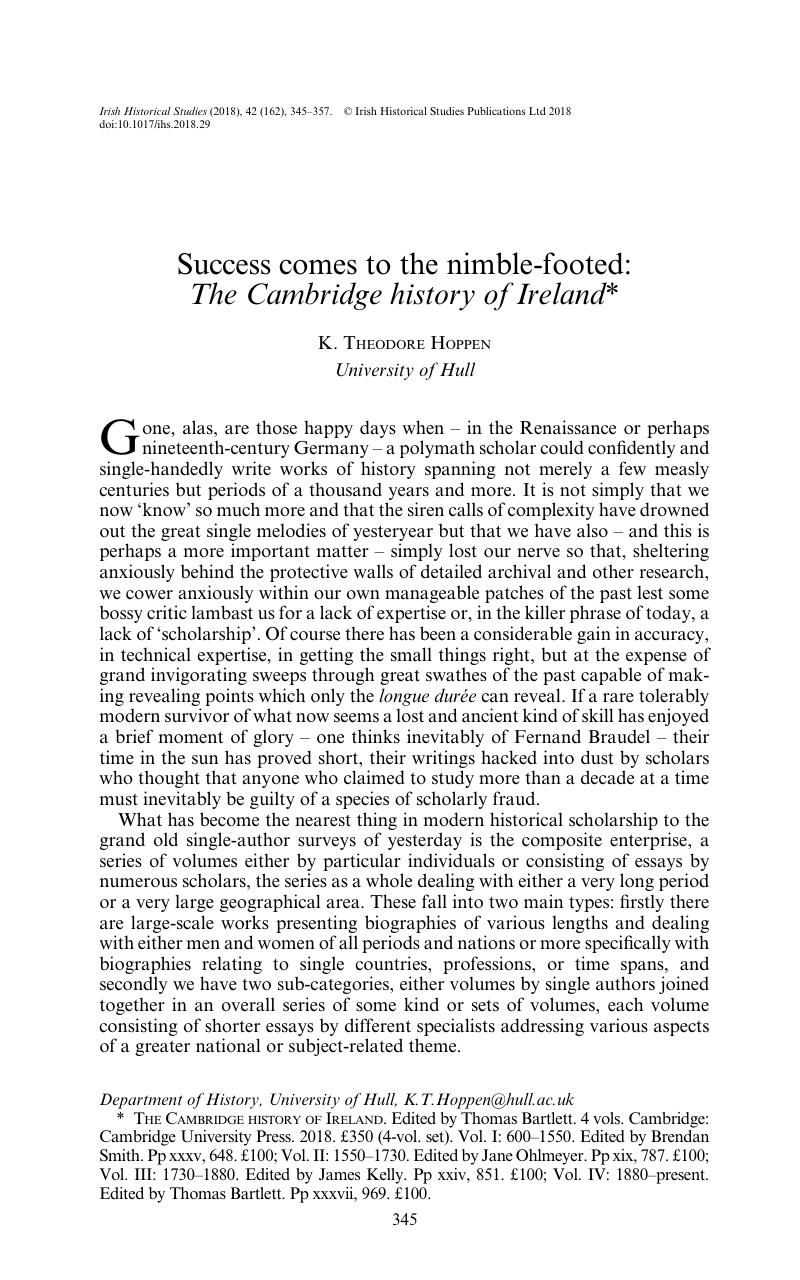No CrossRef data available.
Article contents
Success comes to the nimble-footed: The Cambridge history of Ireland
Published online by Cambridge University Press: 27 December 2018
Abstract

- Type
- Review Article
- Information
- Copyright
- © Irish Historical Studies Publications Ltd 2018
Footnotes
The Cambridge history of Ireland. Edited by Thomas Bartlett. 4 vols. Cambridge: Cambridge University Press. 2018. £350 (4-vol. set). Vol. I: 600–1550. Edited by Brendan Smith. Pp xxxv, 648. £100; Vol. II: 1550–1730. Edited by Jane Ohlmeyer. Pp xix, 787. £100; Vol. III: 1730–1880. Edited by James Kelly. Pp xxiv, 851. £100; Vol. IV: 1880–present. Edited by Thomas Bartlett. Pp xxxvii, 969. £100.
References
1 John Andrew Hamilton, ‘George IV’ in D.N.B., xxi, 204.
2 For a splendid and grimly amusing archive-based account of the vicissitudes of the original Oxford history of England, the volumes of which took from 1934 to 1961 to appear, see Harrison, Brian, ‘“An ambitious venture”: Oxford University Press and The Oxford history of England ’ in Frances Knight and Stewart J. Brown (eds), Religion, identity and conflict in Britain: from the Restoration to the twentieth century: essays in honour of Keith Robbins (Farnham, 2013), pp 233–260 Google Scholar .
A later commissioned volume on 1914–45 appeared, written by A. J. P. Taylor ,who was rather cattily described by the general editor G. N. Clark as ‘not perfectly equipped on topics like philosophy and “thought”’ (ibid., p. 243). See also Harrison’s ‘“A slice of their lives”: editing the DNB, 1882–1999’ in E.H.R. cxix, no. 484 (Nov. 2004), pp 1179–1201.The present reviewer wrote a volume on 1846–1886 in the New Oxford history and is well aware of the difficulties of keeping (roughly) on time and up-to-date.
3 See, for example, Donnelly, J. S. Jr., The Great Irish Potato Famine (Stroud, Gloucestershire, 2002), p. ix Google Scholar .
4 B. Campbell, ‘Nature as historical protagonist: environment and society in preindustrial England’ in Economic History Review, lxiii, no. 2 (May 2010), pp 281–314.
5 K. Holl, Die irische Frage in der Ära Daniel O’Connells und ihre Beurtteilung in der politischen Publizistik des deutschen Vormärz (Ph.D. thesis, Johannes-Gutenberg-Universität Mainz, 1958), p. 83. See also Shane Nagle, Histories of nationalism in Ireland and Germany: a comparative study from 1800 to 1932 (London, 2017), pp 17, 65, 112, 118, 160, 165; K. T. Hoppen, ‘Riding a tiger: Daniel O’Connell, reform, and popular politics in Ireland, 1800–1847’ in T. C. W. Blanning and Peter Wende (eds), Reform in Great Britain and Germany, 1750–1850 (Proceedings of the British Academy, c, Oxford, 1999), pp 121–43.


